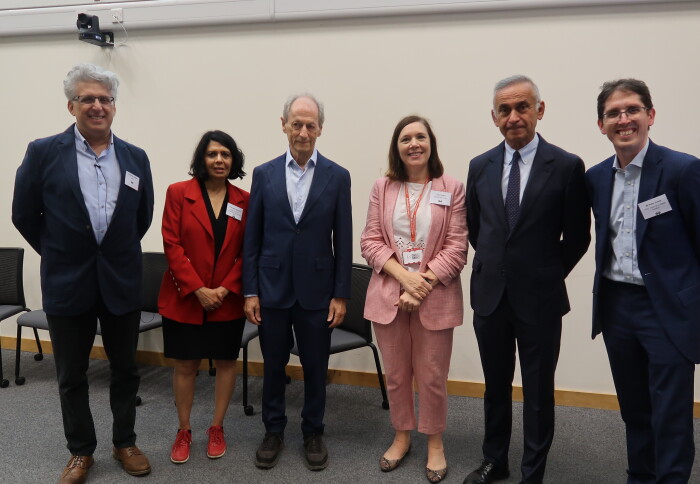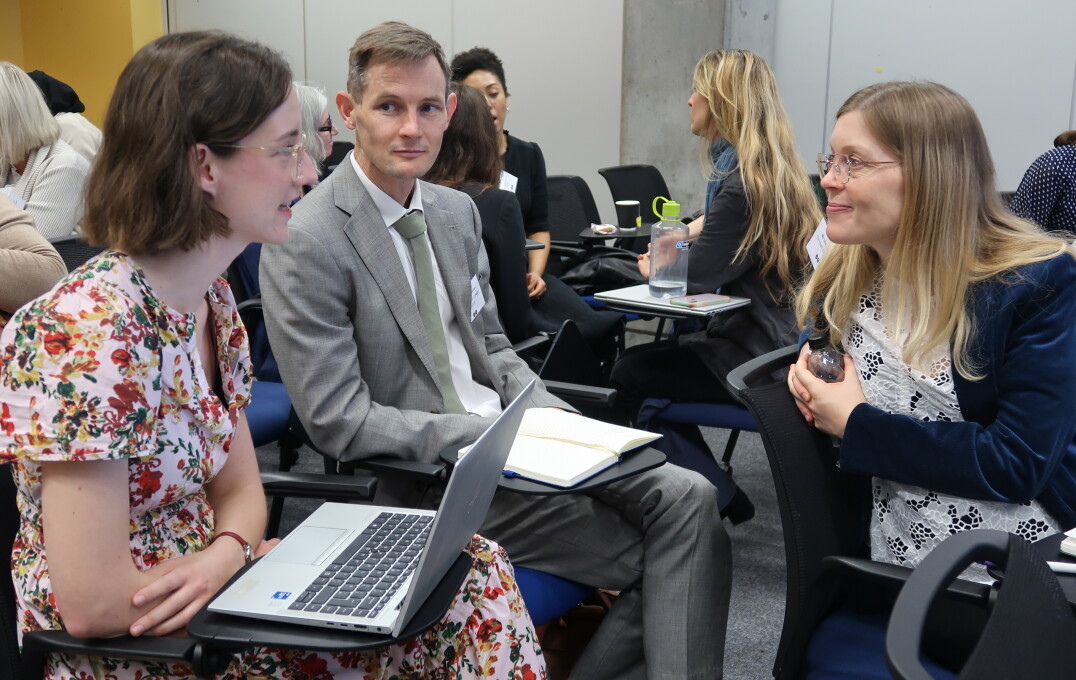“Look out, not up, to improve Health Equity” say health practitioners & patients

Speakers at the event (L-R: Kamran Abbasi, Geeta Nargund, Michael Marmot, Lisa Hollins, Ara Darzi, Peter Howitt); Credit: Holly Merton
At the London event Towards Equity in Health, leaders & practitioners & patients identified best practice to help deliver healthcare equitably
The event, led by Imperial’s Institute of Global Health Innovation (IGHI) with support from the British Red Cross, took place on 18 September with the goals of setting priorities, sharing examples of best practice, challenging thinking and fostering collaborations on health equity – the absence of unfair and avoidable differences in health between people because of their backgrounds.
To open the day, IGHI Co-Director Professor Lord Ara Darzi shared the findings from the NHS review which he led, describing that children starting primary school were twice as likely to be obese if they came from the poorest ten percent in society compared to the most affluent, as an example of how the path to diverging health outcomes can be set at such a young age. Lord Darzi said: “What is clear is that the NHS is not delivering equally for all. People from the most deprived areas of England are twice as likely to wait more than a year for non-urgent treatment...It's a similar story on ethnicity. Those from an Asian background have experienced disproportionality longer waits after the pandemic than those from white backgrounds.”

An agenda packed with keynotes, breakout sessions and panel discussion brought in a range of perspectives, ably chaired by Dr Kamran Abbasi, editor of the BMJ.
Highlights
Professor Michael Marmot delivered a talk on 'Social Justice and Health Equity,' highlighting the social determinants of health in the current societal context. Professor Marmot described how over the last decade, the decline in public expenditure and life expectancy in the UK, worsened by the COVID-19 pandemic, has negatively impacted health. Moreover, the health of poor people has been most affected, with recent data showing excess deaths linked to deprivation.

Additionally, he addressed challenges related to social mobility, child poverty, people living in destitution and the income needed for a healthy diet. Professor Marmot emphasised how several local authorities were acting based on Marmot principles, focusing on education and lifelong learning.
We need to make sure we are using AI to fix the problems it can. Dr Saira Ghafur Digital Health Lead, IGHI
In a panel discussion on digital and health equity, Helen Milner, CEO, Good Things Foundation and Brad Gudger, founder of Alike joined IGHI’s Digital Health Lead, Dr Saira Ghafur. They discussed the data and evidence for social prescribing, the role of digital in influencing policy, and the need for regulation in AI. Dr Ghafur: “AI is not the holy grail, it’s not going to fix all our problems, but at the same time we need to make sure we are using AI to fix the problems it can.”

Liz Padmore, Chair British Red Cross (BRC), began the afternoon sessions sharing BRC’s aim to make things better for the people who are in crisis in the UK, with a focus on health.
Professor Bola Owolabi, Director, National Healthcare Inequalities Improvement Programme, NHS England, then joined remotely to address innovation and transformation for healthcare inequalities improvement. In a hopeful keynote speech with a vision to achieve exceptional quality healthcare for all, Professor Owolabi illustrated the people cost of inequalities, and highlighted the Core20PLUS5 approach. Inequity impacts not just individuals but productivity and the wider economy, so there is a strong business case for moving towards equity in health, explained Professor Owolabi.
In a final session, Professor Geeta Nargund, Vice Chair of British Red Cross, Lead Consultant in Reproductive Medicine at St George’s Hospital NHS Trust and Professor Kevin Fong, Public Engagement and Innovation, Department of Science, Technology, Education and Public Policy (STEaPP), University College London, reflected on leadership in health equity.

Presenting on pregnancy and pre-pregnancy experiences of Black, Asian and Minority Ethnic women, Professor Nargund described shocking statistics: Black women were 3.7 times more likely to die than White women and Asian women were 1.8 times more likely to die than White women (MBRRACE 2022 report). Professor Nargund and her colleagues are working to improve awareness, access and care across ethnic groups.

Professor Kevin Fong highlighted the stark disparities in how London was affected by the Covid-19 pandemic. He presented modelling data that showed how the disease spread through BAME populations and mapped to areas of relative deprivation. Professor Fong emphasised the need for innovation to be rolled out with diversity in mind, to correct systemic biases. Summing up, he said: “Equality diversity and inclusion is not just nice to have, it is not just important, it is an operational imperative. Your system cannot work if you do not include everybody.”
“Equality diversity and inclusion is not just nice to have, it is not just important, it is an operational imperative. Your system cannot work if you do not include everybody"
Sharing priorities that attendees had identified in a pre-event survey, Peter Howitt, Managing Director of Centre for Health Policy, IGHI said “There is scope for government to increase funding for health equity and improve collection of inequalities data. But what today has shown is that local areas can make this happen themselves and should be looking out to the communities they serve, not up to the centre, for health equity solutions.” And Lisa Hollins, Executive Director for UK Operations at the British Red Cross, showed how change could be enacted locally.
Parallel Sessions
Through six parallel sessions (see agenda), attendees had the opportunity to deep-dive into examples from across the UK, and focus further on individuals and their needs.
Health equity for the Roma community and other minority ethnic groups, led by Rebecca Cave, Strategy Programme Manager and Trust Innovation Lead, Royal Cornwall Hospitals NHS Trust and Gareth Walsh Public Health Practitioner, Cornwall Council, showed the impact of an initiative in Cornwall, which formed part of the Core20plus5 scheme and helped areas in south-west England tackle health inequality. The range of health inequalities among Gypsy Roma Traveller (GRT) communities includes low life-expectancy, high rates of suicide and the highest maternal death rate in all ethnic groups. Learning from an initial position that said the GRT community is over-engaged by outreach drives, they amended their approach to run education sessions to improve relationships and strengthen clinical results.
Health equity for older people, led by Dr Adrian Hayter, GP and former National Clinical Director for Older People set the scene with this statistic: At age 65, women in the least deprived places in England are expected to live 7.9 years longer than women in the most deprived areas, while for men the difference was 9.7 years. The discussion focused on the key challenge of deteriorating healthy life expectancy, alongside plateauing life expectancy across the country.
Health Equity for the populations of North West London, opened by Dr Bob Klaber, Consultant General Paediatrician & Director of Strategy, Research & Innovation at Imperial College Healthcare NHS Trust (ICHT), aimed to provide inspiration and guidance for people working with local communities to create positive change and improvements in health equity. Presenting at the session, Asmaham, a Patient Safety Partner at ICHT, shared advice for people working with their local communities such as involving trusted community members, using plain language and offering flexible participation options. Through group discussion, participants highlighted the importance of involving people with lived experience in a meaningful and supportive way from the start. Attendees discussed how community engagement involves us making ourselves vulnerable and listening to community members, working together to create a solution with impact in mind.
Health equity for high-intensity users, led by Victoria Corbishley, Senior Director of Health and Local Crisis Response at British Red Cross, aimed to listen and connect to high intensity users of health care to reduce A&E attendance, hospital admissions and ambulance conveyances. Their data-led patient identification and programme delivery are central to their plan, though the person-centred support they provide helps high intensity users the most.
Health equity as a Marmot Trust, led by East London NHS Foundation Trust (ELFT) focused on three population health priority areas: physical health support; employment support; and income maximisation. The speakers shared their own perspectives of ELFT’s work to tackle these areas, from the views of a service user, carer and member of staff, with one particular case study showing the benefits of providing a financial advice service in outpatient clinics. They also explored how applying the Marmot Trust approach has brought a stronger focus on place-based partnership working. They have been able to partner with Luton, a Marmot Town, to prioritise similar issues and work on them collaboratively.
Health equity services in Cardiff for Marginalized Groups, led by Dr Ayla Cosh, Clinical Director, Cardiff and Vale Health Inclusion Service (CAVHIS). Dr Cosh presented on the service which provides registration and access to medical care for asylum seekers for up to 3-4 months, supporting transition to traditional primary care services, providing alternative treatment services, specialist nursing for the homeless, GP outreach in high need hostels and high inclusion nursing presence in the EU. This expanded service – initially providing only screening for newly arrived asylum seekers – set up an informal health inclusion network across stakeholders in local and third sectors to collaborate and sought sponsorship and support.
With thanks to Chris Ajah Agape, Laura Horga, Peter Howitt, Fiona O'Driscoll, Anant Pratap Singh for their contribution to this piece.
All photos credit to Holly Merton
Article text (excluding photos or graphics) © Imperial College London.
Photos and graphics subject to third party copyright used with permission or © Imperial College London.
Reporter
Victoria Murphy
Institute of Global Health Innovation






